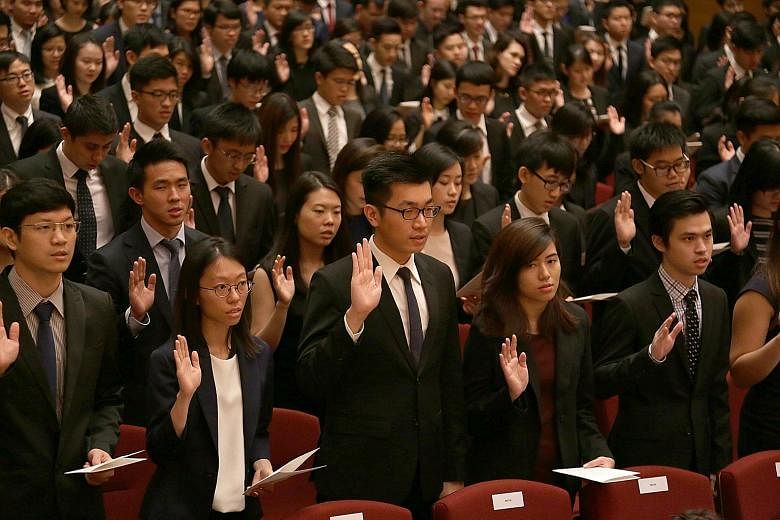The way doctors are trained as specialists is being reviewed, announced Senior Minister of State for Health Chee Hong Tat yesterday - less than two weeks after the Health Ministry (MOH) said there was a need for more "generalists" to serve an ageing population.
Referring to the United States-styled residency programme introduced in 2010 to help speed up training for specialist doctors, Mr Chee admitted that some of its outcomes "have not been as positive in practice as what we had originally hoped for".
He did not elaborate, but doctors and deans of the three medical schools here said they welcome the review, with some noting that the programme had put in place a more structured and supervised training system.
Since MOH made the call urging more young doctors to work in more general fields of specialisation, concerns have been raised about the residency programme. Readers who wrote in to The Straits Times Forum suggested that the current residency programme is geared towards producing specialist doctors - and this has led to there being too many specialists.
Some doctors also said that elements of the US system which the residency programme takes a leaf from may not work well here, given differences in disease patterns. Diseases like diabetes and dengue hemorrhagic fever are more commonly seen here than in the US, for instance.
Said Singapore Medical Council Associate Professor Chen Fun Gee: "Doctors are learning about diseases that are not really important in Singapore, for example, Rocky Mountain fever... We don't see them here. There's no point in us chasing them because I have never seen one case myself."
-
Faster-track residency programme
-
It was reported in 2009 that graduating medical students from the National University of Singapore's Yong Loo Lin School of Medicine could apply for training in 2010 in one of seven specialities.
These specialities were internal medicine, paediatrics, general surgery, preventive medicine, psychiatry, emergency medicine and pathology. The new system was announced by Professor K. Satku, the Ministry of Health's director of medical services.
It was intended to bring together the then long-drawn British-style training programme with a more structured and faster-track residency programme like those in the United States.
Before the US-styled residency programme was introduced, students had to complete five years of medical school and one year of housemanship, prior to starting specialist training.
Depending on the area of speciality, the residency programme shortens the time required for a doctor to be certified.
For example, it now takes five years to complete residency training in internal medicine and six years in paediatric medicine.
The Singapore Medical Council says it has 14,000 doctors on its register currently, of whom around 5,000 are specialists and 2,000 are family physicians.
It was reported in 2009 that graduating medical students from the National University of Singapore's Yong Loo Lin School of Medicine could apply for training in 2010 in one of seven specialities.
These specialities were internal medicine, paediatrics, general surgery, preventive medicine, psychiatry, emergency medicine and pathology. The new system was announced by Professor K. Satku, the Ministry of Health's director of medical services.
It was intended to bring together the then long-drawn British-style training programme with a more structured and faster-track residency programme like those in the United States.
Before the US-styled residency programme was introduced, students had to complete five years of medical school and one year of housemanship, prior to starting specialist training.
Depending on the area of speciality, the residency programme shortens the time required for a doctor to be certified.
For example, it now takes five years to complete residency training in internal medicine and six years in paediatric medicine.
The Singapore Medical Council says it has 14,000 doctors on its register currently, of whom around 5,000 are specialists and 2,000 are family physicians.
Speaking at the Yong Siew Toh Conservatory of Music at the National University of Singapore, where about 400 doctors took the Physician's Pledge, Mr Chee said it may have been better to implement the US-residency programme step by step, and adapt it on the go.
"As with all major changes, what could have been better was a more gradual, step-wise implementation, with appropriate channels to acknowledge concerns of the medical fraternity, and to consider the impact of the changes from a holistic systems perspective," he said.
Moving forward, he said the views from doctors will be much needed. "For this effort to succeed, we need to work closely with our professional bodies and doctors to listen to your feedback and see what we can do together to enhance the system."
Steps have already been taken to encourage more young doctors to become generalists. This year, one in five residency places offered was for family medicine, advanced internal medicine or geriatrics, according to MOH.
This is an increase from 2013, when the number of residency openings in these specialities made up only 12 per cent of the total.
Doctors in these disciplines are considered generalists because they do not focus on a single organ or body part. Their emphasis is on treating patients as a whole - especially those with multiple overlapping medical conditions who would typically be seen by more than one specialist.
"These specialities will be more and more in demand with our ageing population and training places for these specialities should grow further," a ministry spokesman said last month, adding that MOH will continue to monitor the situation and "calibrate the training pipeline for different groups of specialities" to meet Singapore's healthcare needs.
Young doctors were also urged not to be in medicine for "prestige, financial rewards or fame" and "not seek to be a super-specialist when there is limited demand... or choose a speciality primarily because it gives us a good work-life balance".
Prof Chen yesterday acknowledged that "many doctors who enter medical school are actually ambitious. They want to do prestigious disciplines... The need currently is that of general medical care. But it's not that we don't need surgeons."
Dr Lawrence Lam, 31, who took his pledge yesterday, said he is happy being a "generalist". The National University Hospital medicine resident is interested in age and palliative care. He believes that ageing Singapore will need doctors who can manage a wide variety of conditions and advise patients on when they are required to seek out a specialist.
He said: "I think most doctors sometimes need time to find what they're truly interested in. There's no point to rush into any speciality training."


